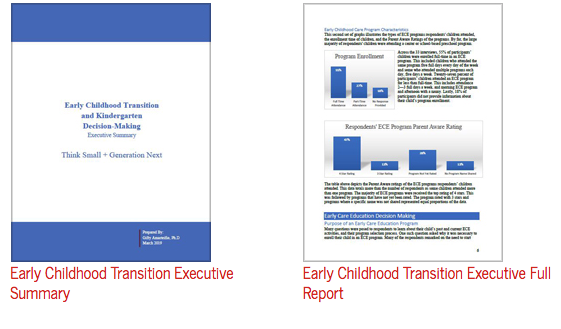By Kristie Thorson, Communications Specialist

The first of its kind in Minnesota, a new study examines how families transition their children from an early childhood education provider to kindergarten.
The study, done through the lens of parents, is intended to help non-profits Think Small and Generation Next understand how families navigate the process of identifying a school and enrolling into kindergarten. More than 30 parents were interviewed twice each —once during Spring 2018, as they were considering kindergarten options for their child, and again in Fall 2018 after their children started kindergarten.

“As people are starting to look at kindergarten transition more and more, this report has really relevant information because it was based on parents telling us how that experience was,” said Cisa Keller, Senior Vice President of Early Childhood Quality Development at Think Small.
Five key takeaways from the study were:
- Access, agency, and privilege subtly influence the decision-making process
Access to information is a consistent concern. Some families do not know how to navigate the complicated school system to gain information, while others can obtain information, but cannot make effective use of it. Having access to the necessary information about alternative options and knowing their requirements will create a pathway for families to exercise agency in their decision-making.
- Families prioritize personal networks as a key source of information
While a lot can be done to provide fundamental information to families, when it comes to receiving information that will influence their decisions, families strongly prefer that information comes from someone they know and trust.
- Values and priorities influence key decision-making factors
When weighing their child’s kindergarten choice options, families identify key factors (i.e., test scores, location/neighborhood, school culture), and informally assign their factors a weight of importance.
- Families making decisions need more information
At almost every stage of the kindergarten decision-making process, families felt misinformed and lacking necessary information. To address this, multiple event types should be held to provide families with the information they need to feel confident in their decisions.
- School tours provide first-hand perspective of school options
Touring an ECE site or elementary school provides families an opportunity to gather untraditional data and non-tangible information about a program or school.
The knowledge gained from the study will help Think Small, Generation Next and others understand what the early childhood experiences were of students who are arriving to kindergarten either academically prepared or unprepared, to make policy and programs decisions to best help families with enrollment choices, and to better link public investment to changes in outcomes.
Read the full Early Childhood Transition and Kindergarten Decision-Making Report and the Executive Summary here or they can also be found on Think Small’s website at www.thinksmall.org/pathways.








